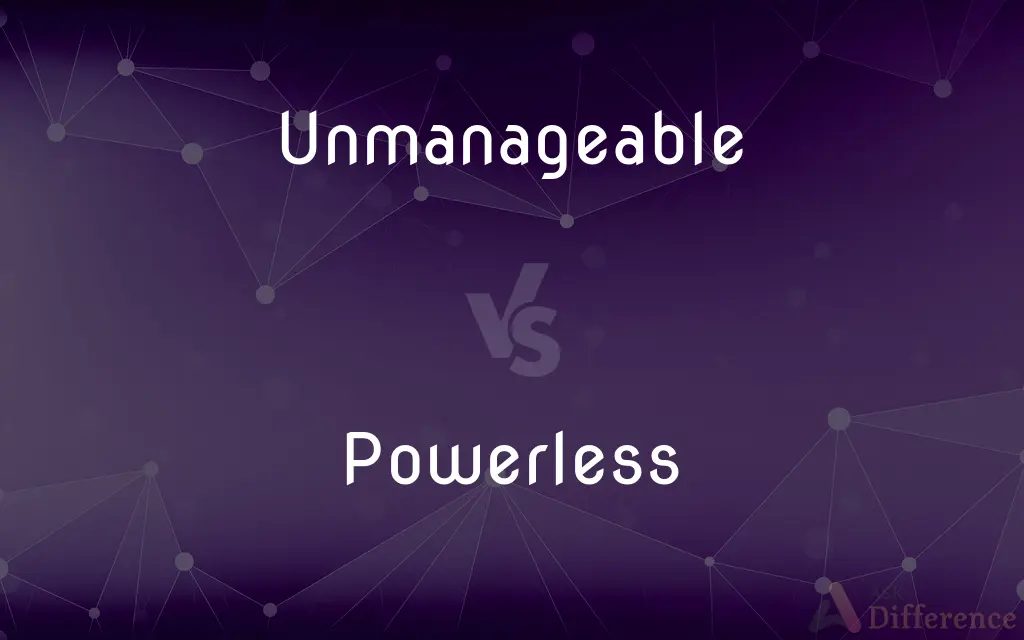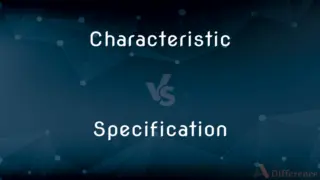Unmanageable vs. Powerless — What's the Difference?
Edited by Tayyaba Rehman — By Urooj Arif — Updated on April 22, 2024
"Unmanageable" describes something too difficult to control or handle, e.g., "unmanageable debt." "Powerless" indicates a lack of power, authority, or ability, e.g., "feeling powerless in a situation."

Difference Between Unmanageable and Powerless
Table of Contents
ADVERTISEMENT
Key Differences
Unmanageable refers to something that is difficult to control, manage, or handle due to its complexity, size, or nature, such as an unmanageable workload. On the other hand, powerless describes a state or condition where an individual or entity lacks the power, strength, or authority to influence outcomes or situations, such as feeling powerless in the face of adversity.
While unmanageable often applies to situations, tasks, or objects that exceed one's capacity for management or control, such as unmanageable behavior in children, powerless is more about the absence of ability, control, or authority in a broader sense, including emotional, social, or political contexts, such as being powerless to stop changes.
Something unmanageable can become a source of stress, frustration, or failure due to the inability to impose order or achieve desired outcomes. For instance, an unmanageable debt can lead to financial ruin. Conversely, feeling powerless can lead to feelings of resignation, despair, or dependency, as when individuals feel powerless to improve their circumstances.
The concept of being unmanageable is often related to the tangible aspects of life, such as tasks or physical challenges that can potentially be mitigated with proper strategies or interventions. Whereas the notion of powerlessness can encompass both tangible and intangible aspects, including emotional states or societal dynamics, where the solutions may not be as straightforward.
Comparison Chart
Definition
Difficult to control or handle
Lacking power, authority, or ability
ADVERTISEMENT
Application
Tasks, behavior, situations
Emotional states, social/political situations
Associated Feelings
Stress, frustration
Resignation, despair
Potential Solutions
Management strategies, interventions
Empowerment strategies, support systems
Example Situations
Unmanageable workload, unmanageable debt
Feeling powerless in decision-making, powerless to change societal issues
Compare with Definitions
Unmanageable
Too complex to handle.
The project became unmanageable due to its scope.
Powerless
Unable to effect change.
Powerless to stop the injustice.
Unmanageable
Not easily governed.
Unmanageable class behavior.
Powerless
Devoid of strength.
Feeling physically powerless after the illness.
Unmanageable
Beyond control.
His anger was unmanageable.
Powerless
Lacking authority.
She felt powerless in the meeting.
Unmanageable
Overwhelming tasks.
The workload is unmanageable.
Powerless
Incapable of action.
They were powerless in the emergency.
Unmanageable
Requiring excessive effort.
The debt has grown unmanageable.
Powerless
Without influence.
A powerless minority in society.
Unmanageable
Difficult or impossible to manage or control
Unmanageable traffic congestion.
Powerless
Lacking strength or power; helpless and totally ineffectual.
Unmanageable
Difficult to carry or maneuver; unwieldy
Unmanageable bundles.
Powerless
Lacking legal or other authority.
Unmanageable
Not manageable; not readily submitting to handling or management; not easily restrained, governed, or directed
Powerless
Lacking sufficient power or strength.
I admit that I am powerless over my hatred towards white people in ways that I am unable to recognize fully, both at this time and in the past.
Unmanageable
Difficult to use or handle or manage because of size or weight or shape;
We set about towing the unwieldy structure into the shelter
Almost dropped the unwieldy parcel
Powerless
Lacking legal authority.
The traffic warden was powerless to stop me driving away.
Unmanageable
Difficult to manage or control
Powerless
Destitute of power, force, or energy; weak; impotent; not able to produce any effect.
Unmanageable
Difficult to solve or alleviate;
Uncontrollable pain
Powerless
Lacking power
Unmanageable
Not susceptible of improvement;
Uncontrollable children
An uncorrectable habit
Common Curiosities
How does someone become powerless?
Someone becomes powerless when they lack the power, authority, or ability to influence outcomes or make decisions.
What are common responses to feeling powerless?
Responses can include seeking support, empowerment strategies, or acceptance of the situation.
Is there a way to manage something that seems unmanageable?
Yes, through strategic planning, delegation, and seeking help, unmanageable tasks can become more manageable.
How can someone regain power in a situation where they feel powerless?
By identifying areas where they can make a difference, seeking support, and using available resources to gain influence or control.
What does it mean when a situation is described as unmanageable?
It means the situation is too difficult to control or handle effectively.
Can societal structures contribute to feelings of powerlessness?
Yes, societal and systemic structures can significantly impact individuals' feelings of power or powerlessness.
What role does support play in overcoming powerlessness?
Support from others can provide the resources, encouragement, and strength needed to overcome feelings of powerlessness.
Can unmanageable situations make someone feel powerless?
Yes, facing unmanageable situations can lead to feelings of powerlessness due to the inability to exert control.
How do emotions play into the concepts of unmanageability and powerlessness?
Emotions significantly influence how we perceive and respond to unmanageable situations or feelings of powerlessness.
Do unmanageable and powerless mean the same thing?
No, unmanageable refers to something difficult to control, while powerless indicates a lack of power or ability.
Is it possible to feel powerless in one area of life but not another?
Yes, one might feel powerless in professional settings but empowered in personal relationships, or vice versa.
Are there psychological impacts of chronic exposure to unmanageable situations or powerlessness?
Yes, chronic exposure can lead to stress, anxiety, depression, and a sense of hopelessness.
How can societal change impact individual feelings of powerlessness?
Societal changes that address systemic issues can empower individuals by providing more opportunities for influence and participation.
In what ways can empowerment strategies vary between unmanageable and powerless situations?
Strategies for unmanageable situations might focus on task management, while empowerment in powerless situations might focus on gaining influence or resources.
Can technology render tasks previously considered unmanageable, manageable?
Yes, advancements in technology can provide tools and solutions that make previously unmanageable tasks manageable.
Share Your Discovery

Previous Comparison
Memic vs. Mimic
Next Comparison
Characteristic vs. SpecificationAuthor Spotlight
Written by
Urooj ArifUrooj is a skilled content writer at Ask Difference, known for her exceptional ability to simplify complex topics into engaging and informative content. With a passion for research and a flair for clear, concise writing, she consistently delivers articles that resonate with our diverse audience.
Edited by
Tayyaba RehmanTayyaba Rehman is a distinguished writer, currently serving as a primary contributor to askdifference.com. As a researcher in semantics and etymology, Tayyaba's passion for the complexity of languages and their distinctions has found a perfect home on the platform. Tayyaba delves into the intricacies of language, distinguishing between commonly confused words and phrases, thereby providing clarity for readers worldwide.














































